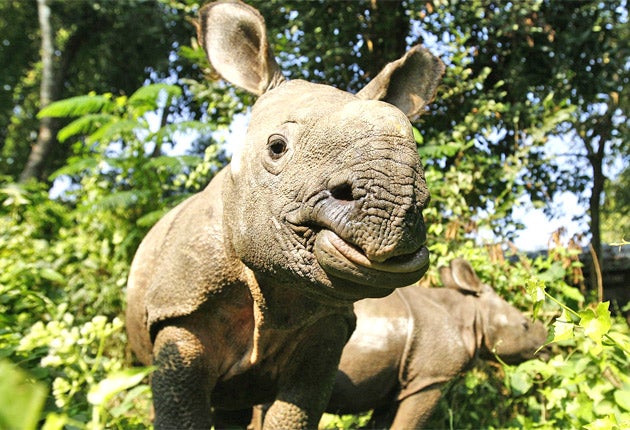Rhinos are on the rise after surviving war and poachers in Nepal

Your support helps us to tell the story
From reproductive rights to climate change to Big Tech, The Independent is on the ground when the story is developing. Whether it's investigating the financials of Elon Musk's pro-Trump PAC or producing our latest documentary, 'The A Word', which shines a light on the American women fighting for reproductive rights, we know how important it is to parse out the facts from the messaging.
At such a critical moment in US history, we need reporters on the ground. Your donation allows us to keep sending journalists to speak to both sides of the story.
The Independent is trusted by Americans across the entire political spectrum. And unlike many other quality news outlets, we choose not to lock Americans out of our reporting and analysis with paywalls. We believe quality journalism should be available to everyone, paid for by those who can afford it.
Your support makes all the difference.Nepal's population of endangered rhinos appears to be growing after years of decline caused by a debilitating civil war and widespread poaching, new figures show.
In a rare piece of good news for threatened species in South Asia, Nepal's department of national parks said that this month's survey found the rhino population stood at 534 animals, compared with only 435 in 2008.
Maheshwar Dhakal, an ecologist with the department, said the increase in numbers was due to a more effective anti-poaching strategy and improved relationships with communities close to where the animals live.
"Working closely with the community to set up buffer zones has helped in our conservation," Mr Dhakal told the Associated Press.
Years of civil war and turmoil in Nepal have taken a devastating toll on the country's wildlife. While politicians were distracted trying to agree to a post-conflict settlement with former Maoist rebels, poachers were operating largely unhindered in a number of the national parks. The horn of the rhino is highly sought in East Asian medicine as a supposed sexual stimulant.
Mr Dhakal said that during the civil war, which ended in 2006, a number of soldiers were pulled away from conservation duties. But since the conclusion of hostilities, which left at least 13,000 people dead, those troops have been redeployed to try and keep poachers out.
The government has also introduced programmes to help villagers living near the parks and forests, a move successfully tried in India to help preserve the country's tigers.
Another important development was the arrest earlier this year of an alleged poacher accused of killing more than 15 one-horned rhinos. All of the animals allegedly taken by Kajiman Praja were killed in the Chitwan national park, in the Terai district of southern Nepal. Wildlife groups welcomed the new figures, which show an increase of 99 rhinos.
"We are encouraged that increased WWF support for the anti-poaching efforts of the government has resulted in an increase in the rhino population within three years," said Christy Williams, of WWF's programme for Asian rhino and elephants.
Krishna Prasad Acharya, head of the government's national parks department, said: "This is a fine example of working together where all conservation partners and local communities are contributing to the conservation efforts of the government."
The results suggest the vast majority of the rhinos are living in the Chitwan park, where the survey teams identified 503 animals. The others were in the Bardia national park and the Shuklaphanta wildlife reserve.
The three-week survey of the southern plains of Nepal was carried out by experts riding on elephants using GPS devices and cameras. The one-horned rhinos are also found in northern India.
Join our commenting forum
Join thought-provoking conversations, follow other Independent readers and see their replies
Comments